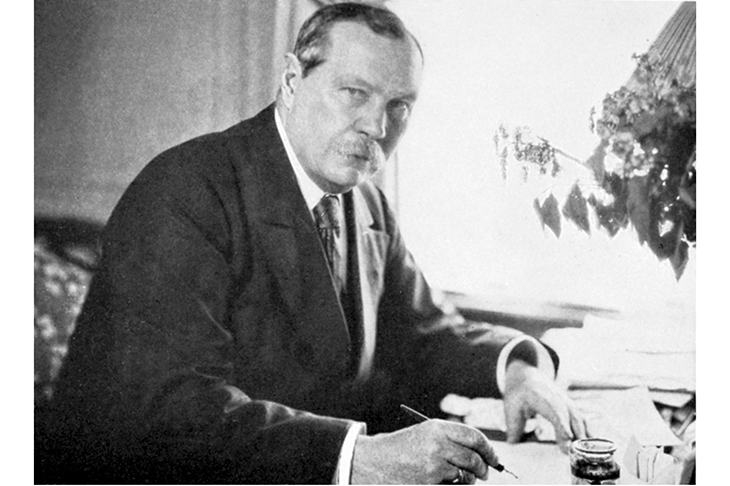It has been described as Britain’s Dreyfus Affair — the wrongful imprisonment in 1903 of a half-Indian solicitor George Edalji in the Midlands and the refusal of the authorities to pay him compensation, even though he was later pardoned.
In a case tainted by racism, class prejudice and plain stupidity, Edalji was accused of mutilating horses, sheep and cattle, and then forging letters to implicate others, thus creating mayhem in the village of Great Wyrley where he lived, in a mining district in Staffordshire. His cause was taken up by a home-grown Zola in the form of Sir Arthur Conan Doyle who was happy to replicate the investigatory skills of his famous fictional detective, Sherlock Holmes.
With the help of insights into the Parsee background of Edalji’s family in India, and recently discovered papers about the police response to the affair, Shrabani Basu has sought to breathe new life into a story which has had many airings but never quite caught the public imagination, certainly not in J’Accuse terms. (The closest contender was Julian Barnes’s novel Arthur and George in 2005.)
A journalist by training, Basu writes pithily and engagingly, with an eye for striking detail. She clearly thought Edalji’s woeful treatment worth revisiting in the wake of recent debate about race and empire, though her story is really more about class and rural petty-mindedness. But she gives a good account of what it was like for someone with a dark skin to be mired in a toxic environment sullied by some very unsavoury people.
Much of the action had already taken place before Conan Doyle became involved in late 1906. The deeper background is that George Edalji’s father Shapurji was a Parsee who had converted to Anglicanism in Bombay, joined the priesthood, and studied in England, where he married a local girl, Charlotte, who bore him three children.
The mild-mannered Shapurji was appointed vicar of Great Wyrley in 1876. A dozen years later hate messages began appearing at the vicarage. These increased in intensity and malice (often racially couched and directed against his eldest son, George), particularly after a spate of savage animal mutilations in the surrounding countryside in 1903. George was arrested and charged with one of these outrages. Although he protested his innocence, he was sentenced to seven years hard labour, subsequently commuted to three.
After his release, George approached Conan Doyle for help in clearing his name. At the time the author was feeling unusually low, having just lost his wife Louise to tuberculosis. So, as a seeker after truth, he was delighted to find a diversion.
At their first meeting in London, he was struck by the way the young solicitor peered closely at a newspaper. As a doctor who had studied ophthalmology, Conan Doyle realised Edalji had severe astigmatism and could not have found his way across the fields where the mutilations were alleged to have occurred.
After visiting the family in Great Wyrley he called on Staffordshire’s chief constable, Captain the Honourable George Anson, second son of the Earl of Lichfield. He was immediately struck by Anson’s deviousness and obvious antipathy to Edalji and his family, and his subsequent enquiries revealed a catalogue of failings by police and judicial authorities which had ensured that George did not get a fair trial. Conan Doyle then wrote a series of articles for the Daily Telegraph setting out his misgivings about Edalji’s conviction. He even had a suspect — a former butcher with a violent past called Royden Sharp, who had boasted of owning a lancet capable of the crimes, and who had been away over a lengthy period when no threatening letters were sent to the vicarage.
As a result of Conan Doyle’s campaign, a Home Office committee granted Edalji a pardon, though no compensation. Sherlock Holmes’s creator proved a dogged, if occasionally mistaken, investigator. He wrongly believed a man in California called Frank Sharp was Royden’s brother and had written incriminating letters. But he was right about the unpleasantness of Anson, who had made racially-inflected innuendos of sodomy on learning that Edalji shared a bedroom with his father.
Basu strives for the narrative-drive-supported-by-cumulative-detail approach associated with Kate Summerscale in books such as The Suspicions of Mr Whicher. But the ruffians of Great Wyrley tend to get lost in a sad story of ignorance and prejudice, and one can see why Edalji has never had the box-office appeal of Dreyfus. More absorbing, however, is her account of the battle of wits between Conan Doyle and Anson (who was once ruffled enough to ask ‘Is C.D. quite mad?’). It nails the nastiness of a peculiarly English scandal.






Comments